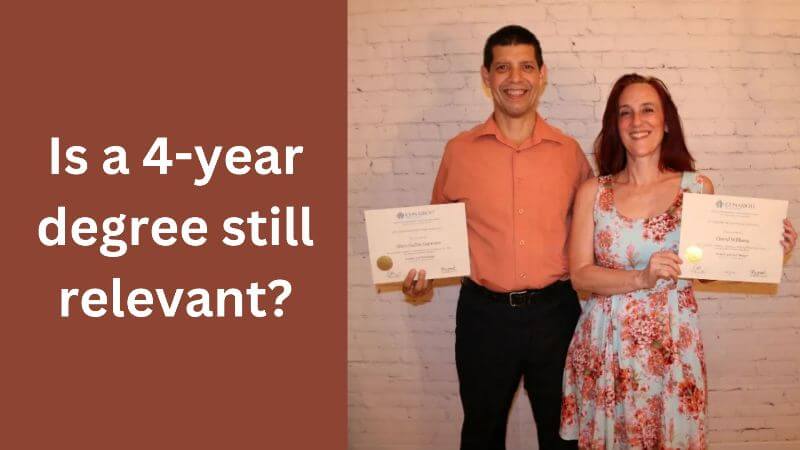I went to Concordia University (in Montreal) and earned a 4-year degree. For me, it took 5 years because I had to learn French as well, as French is necessary to survive in a French speaking province such as Quebec, Canada.
For me, getting a degree was useless. I was never able to secure a job. I was a victim of racial discrimination. Quebecois employers didn’t like the fact that my French was not perfect, and they simply didn’t offer me a job.
I was lucky enough to open my own business as a dance teacher. Ironically, in part because of my Hispanic accent, I had more credibility than non-Hispanic dance teachers, and my business was a success since day one. Today, twenty years later, my business still provides an income.
Nowadays, a four-year degree has become less of a determining factor in whether you will achieve financial success or not.
Many people, including myself, are furthering their education by obtaining short term certificates from different local colleges.
Fewer people are applying for a college education due to the financial burden, and more corporations are accepting workers without a four-year degree. If you have the skills to do the job, the college certificate is less important.
Companies such as AT&T, Dell, Google, Apple, Hilton Hotels, Ernst & Young, Oracle, IBM, Intel, and the U.S. government are extending hiring opportunities to people without college degrees.
Also, not all degrees are the same. Most degrees cost about the same, but they have different values.
A degree in liberal arts, such as philosophy or art history, has very little value in the job market, while a degree in engineering or accounting has high value.
When considering the time and expense of getting a degree, what you get in return is very important. If you are going to end up unemployed because you studied Greek Mythology, then what was the value of that diploma? You could have studied Greek Mythology on your own time without getting into debt and without leaving the job market.
Of course, countries such as Canada and the U.S. need qualified people to fill jobs where a high degree of training is needed. So it’s nice, as a society, if more people go to school and learn technical skills where there is a high demand for labor.
Also, it has been proven that, on average, people with a higher level of education earn more money in the long run. Someone with a doctorate degree in electrical engineering is more likely to earn more money than someone who only has a high school diploma.
These are individual decisions made by each one of us. We know that to earn more, we have to put in the time and effort to get a higher level of education in a field where there is a high demand for that kind of labor, so at the end of the day, we all can determine how much income we want to earn.
Finally, we should not be surprised by the level of income inequality reflected in our education choices. It is quite normal for someone who studied physics to earn four or five times as much as someone who studied English literature. Every student knows that different professions pay different salaries. If someone still chooses to study some kind of social science, then they should not complain when they see that lower paycheck.
Previous opinion posts
